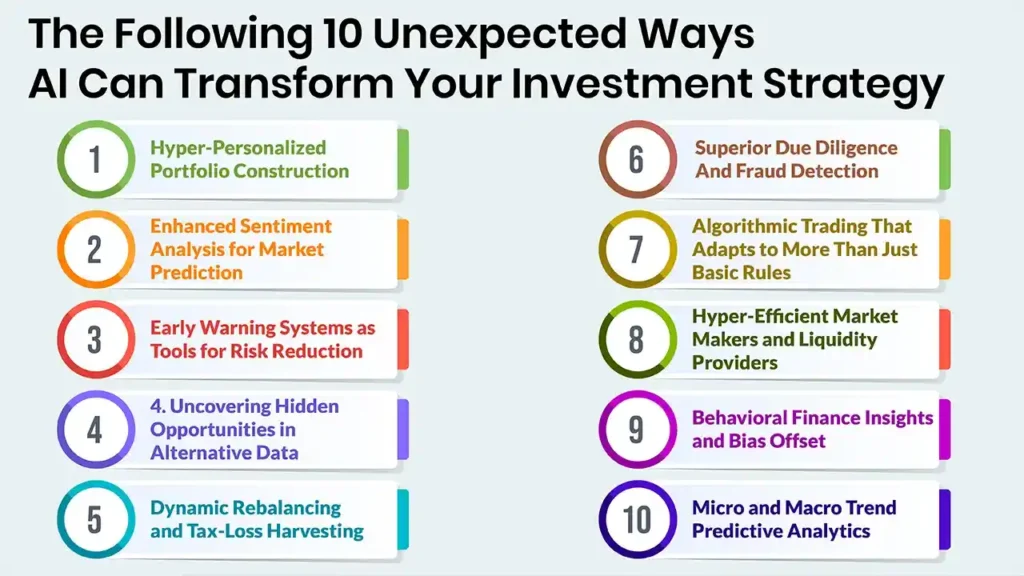AI is transforming industries at breakneck speed, and the financial sector isn’t immune. In addition to pure automation, AI has deep and “surprising ways AI could change the shape of your investment strategy.
This article will explore 10 unexpected ways AI can transform your investment strategy and how this emergent technology could enable both individual investors and financial advisors to make smarter, data-driven and potentially more profitable investment decisions.
1. The AI Edge: How Today’s Investors Get Ahead
Moving Beyond Traditional Analysis
There are some problems with the conventional human analysis, such as bias, the limited data processing ability and the time consumption.
AI is, however, great with large volumes of data mining and pattern recognition coupled with predictive data analytics, so this means a more holistic view regarding possible investment strategies that focus on vast amounts of new and previously historical data inputs.
2. The Following 10 Unexpected Ways AI Can Transform Your Investment Strategy:

1. Hyper-Personalized Portfolio Construction
Detail: Through data crunching a myriad of your personal financial information, risk tolerance, goals and even behaviors, AI can craft far more customized portfolios than traditional ways.
Unexpected Change: AI uncovers your emotional bond with money by going beyond standard risk assessments. Read about how AI sentiment analysis is changing stock price predictions.
2. Enhanced Sentiment Analysis for Market Prediction
Detail: AI algorithms can sift through millions of news articles, social media posts, earnings call transcripts and forums to measure market sentiment in real time.
Unexpected Change: AI detects latent shifts in public sentiment just before price changes, which human analysts might miss.
3. Early Warning Systems as Tools for Risk Reduction
Detail: AI models can identify anomalies, early patterns in market data, economic cues and geopolitical events that indicate potential risks before the risks become visible to the human eye.
Unexpected Change: Early detection of both alarming and gray rhino events can improve risk management by leaps and bounds.
4. Uncovering Hidden Opportunities in Alternative Data
Details: AI is able to predict business performance by utilising unstructured data, such as credit card transaction data, weather patterns, web search trends, and satellite imagery that tracks foot traffic in stores.
Unexpected Change: From data sources that were previously thought to be unimportant or too complicated for financial planning, AI now extracts insights that can be invested in.
5. Dynamic Rebalancing and Tax-Loss Harvesting
Detail: Software based on artificial intelligence can oversee your portfolios and markets at all times and perform rebalancing and tax-loss harvesting automatically and optimally.
Unexpected Change: AI handles these tasks as they occur on a day-to-day basis for the ultimate tax efficiency and goal alignment as opposed to an annual tweak.
6. Superior Due Diligence And Fraud Detection
Detail: AI can review financial statements, legal documents and regulatory filings far faster than any human could, uncovering inconsistencies, red flags or outright fraud in target businesses.
Unexpected Change: AI can identify discrepancies that human teams might overlook by acting as an unrelenting, objective auditor.
7. Algorithmic Trading That Adapts to More Than Just Basic Rules
Detail: Unlike traditional algorithms, AI-powered trading systems learn how to learn and adapt to changing market conditions and improve strategy dynamically.
Unexpected Change: What these systems grow are trading strategies, not just rule-based ones but ones that truly “learn” from market movements and past results.
8. Hyper-Efficient Market Makers and Liquidity Providers
Detail: AI can process large order books and place trades with speed and accuracy that human traders cannot match, adding liquidity to the market.
Unexpected Change: This efficiency could help lower spreads for all traders, improving market performance generally.
9. Behavioral Finance Insights and Bias Offset
Details: AI can help you determine your own behavioural biases (e.g. loss aversion, anchoring) from your trading history and make rational decisions.
Unexpected Change: As a neutral coach, AI steers you from human investment gaffes.
10. Micro and Macro Trend Predictive Analytics
Detail: AI can process numerous datasets to predict not only stock prices, but also wider economic shifts, industry changes and consumer behaviours that affect investments.
Unexpected Change: This ability gives banks the ability to predict deep interdependencies between the global markets and economies.”
3. The Future is Here: Utilizing AI For Your Investments
How the Power of AI Is Available to Individual Investors
- Robo-Advisors: Several are currently using AI for portfolio management and rebalancing.
- AI Stock Research Tools: An ever-growing list of tools for independent stock research.
- Learning and Research: Apply AI insights from financial news services and research developers into your processes.
Collaboration Over Replacement: The Human-AI Synergy
Artificial intelligence is a great tool that can automate and support human decision-making, not replace it completely. This is particularly the case in complex decisions of strategy and ethics in finance.
Conclusion: embrace the revolution in AI investing.
So there you have it – the “10 Unexpected Ways AI Can Transform Your Investment Strategy” – or how it will personalise, predict, analyse and protect your investments. The financial game is changing, and insight and strategic utilisation of AI can offer investors a huge advantage, going well beyond the standard to explore uncharted opportunities to grow and thrive.
Call to Action
Readers should embrace AI-enhanced technologies and ideas and think about how to implement these in their own investment practices.”
Frequently Asked Questions
1. The investment in AI is absolutely safe, and you can definitely make a fortune.
No. Although AI can vastly improve analysis and decision-making, no investment strategy is totally secure, and profits are never a foregone conclusion. AI algorithms work off historical data and probabilities; they can’t predict unexpected “black swan” events or completely process irrational market behaviour.
Q2: Do I need to understand tech to invest with the help of AI?
Not necessarily. A lot of AI-powered investment services and robo-advisors are developed on a user-friendly platform so anyone without a strong tech background can use them as well. The question is what the A.I. does — and how it dovetails with what you’re trying to accomplish with your investments.
Q3: Will artificial intelligence replace human financial advisers?
AI should complement rather than replace financial advisors. AI is great at data processing, analysis, and execution, but only humans can offer empathy, deal with complicated personal scenarios, provide behavioural guidance, and address emotional issues that are a part of finance and that AI has no awareness of. This is best managed with a “hybrid” approach.
What type of data is AI analysing for investment insights?
AI crunches huge amounts of traditional & alternative (stock prices, trading volumes, financial statements, economic indicators/satellite imagery, social media sentiment, news/credit card transactions, weather patterns, website traffic) data to find new insights.
What are the biggest risks of relying on AI to decide how to invest?
Risks include “garbage in, garbage out” (if the data is bad), overdependence and thus lack of human oversight, algorithmic bias (if the AI is trained on biased data) and AI’s blindness and incapability of dealing with truly novel and unprecedented events outside its training data. The continued need for constant monitoring and human supervision is important.

Leave a Reply